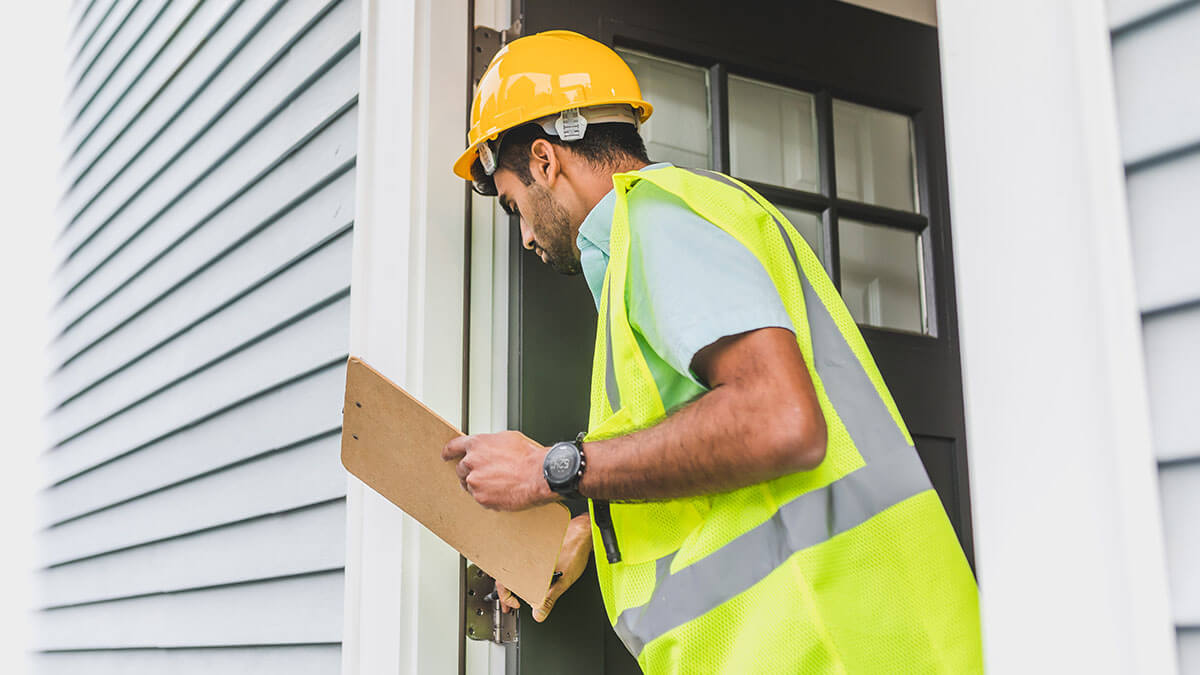A home inspection can shift a sale from smooth sailing to sudden turbulence. In fact, industry sources suggest that 10–15% of home purchase agreements are canceled following inspection findings, one of the top deal-breakers in today’s market.
But a failed sale isn’t inevitable. With the right strategy, understanding the report, prioritizing repairs wisely, and negotiating smartly, you can keep control of the process.
This guide walks sellers step by step through what to do after the home inspection. We’ll cover how to interpret the report, decide what matters most, get reliable estimates, negotiate repairs or credits, and prepare for a smooth closing. And if repairing feels overwhelming, iBuyer.com offers an alternative: a fair cash offer that lets you skip repair hassles entirely.
Instant Valuation, Confidential Deals with a Certified iBuyer.com Specialist.
Sell Smart, Sell Fast, Get Sold. No Obligations.
Home Inspection Full Guide
- Review Your Home Inspection Report With Your Agent
- Prioritize Urgent Repairs and Budget for the Rest
- Negotiate Repairs or Credits Strategically
- Get Estimates and Verify Contractor Credentials
- Final Walk-Through and Preparing for Closing
- Reilly’s Two Cents
- Home Inspections: How to Turn Stress Into Strategy
- Frequently Asked Questions
Review Your Home Inspection Report With Your Agent
Once you receive the inspection report, your first move should be a detailed review alongside your real estate agent. That person’s experience can help you see which items are material threats, and which are routine maintenance.
Why this matters:
- A full 86% of inspections reveal at least one issue, most are not deal-killers.
- But some findings are serious enough to halt the deal, especially defects tied to structure, safety, or major systems.
Here’s how to break it down:
1. Classify issues by severity
- Critical: foundation cracks, major roof leaks, electrical hazards
- Moderate: water damage, plumbing leaks, HVAC wear
- Cosmetic or minor: paint chips, loose fixtures, cabinet wear
2. Cross‑reference the inspection contingency in your contract
This clause often defines how much the buyer can request, how quickly you must respond, or under what terms they can back out. Review it carefully to understand your legal obligations.
3. Ask for specialist input where needed
If the report notes issues in roofing, structural beams, or HVAC, consider hiring a specialist for a “second look.” Their evaluation can confirm severity and cost, reducing negotiation risk.
4. Be aware of inspection bias
Some buyers use inspection reports as aggressive leverage. Your agent can help you distinguish reasonable requests from excessive or nitpicky ones, so you don’t overcommit.
Take your time in this stage. A solid understanding of the issues at hand sets the foundation for effective negotiation.
Prioritize Urgent Repairs and Budget for the Rest
After reviewing the inspection report, your next step is to separate high-priority repairs from those that are cosmetic or negotiable. Why? Because certain defects, especially those tied to health, safety, or structural stability, can directly affect your buyer’s financing or insurance options.
Start With Health and Safety Hazards
Lenders and insurers often require specific issues to be resolved before approving the deal. According to the American Society of Home Inspectors (ASHI), common deal-breaking problems include:
- Electrical safety issues
- Mold or water damage
- Foundation cracks
- Roofing failures
- HVAC or plumbing systems at end of life
Fixing these upfront reduces the risk of buyer withdrawal or last-minute financing delays.
Consider Cost-Value Balance
While some repairs are mandatory, others fall into a gray area. Here’s how to approach them:
- Fix Now If: It’s relatively low cost and prevents buyer pushback.
- Offer Credit If: It’s a large repair the buyer may want control over (e.g., appliance replacement, flooring).
- Disclose & Decline If: It’s cosmetic, well-documented, and doesn’t affect habitability (e.g., scuffed walls, minor trim damage).
A survey found that buyers request concessions on 75% of inspections, and sellers agree to at least some of them in nearly every case. Knowing which items you’ll address and which you won’t helps anchor the coming negotiation.
Budget for What Comes Next
If you plan to proceed with repairs, gather rough cost estimates to avoid surprises. Budget 10–15% extra for unexpected complications. If you’re opting for credits instead, understand how those will impact your net proceeds at closing.
Negotiate Repairs or Credits Strategically
With your repair priorities in place, the next step is negotiation. This stage often determines whether a deal moves forward smoothly, or stalls entirely. According to the National Association of Realtors (NAR), 16% of delayed home closings are directly related to inspection or repair issues. A strategic, well-informed approach can prevent costly delays or buyer fallout.
Choose the Right Negotiation Tool: Repair or Credit
There are typically three ways to respond to repair requests:
1. Make the Repairs
This can be useful when the fixes are clear-cut, affordable, and require permits or inspections. Completed work provides peace of mind to buyers and reduces post-inspection tension.
2. Offer a Repair Credit at Closing
A credit allows the buyer to take on repairs after the deal closes. This is often preferred when:
- You’re on a tight timeline
- The buyer wants to choose their own contractor or materials
- The repairs might disrupt your move-out schedule
3. Negotiate a Price Reduction
In some markets, reducing the sale price instead of issuing a repair credit is more tax-efficient or preferred by buyers. Your agent can advise based on local norms.
Document Everything
Once an agreement is reached, it must be put in writing. Your agent will help update the purchase contract or add an addendum that spells out:
- Which repairs will be completed
- Who pays for them
- When they’ll be finished
- Any proof (invoices, photos, permits) required before closing
Oral agreements aren’t enough. A properly documented repair agreement protects both sides and prevents confusion on walk-through day.
Set Realistic Timelines
Be honest about how long repairs will take, especially if licensed contractors or permits are involved. Buyers will typically want repairs completed at least a few days before closing to allow time for re-inspection or document review.
Get Estimates and Verify Contractor Credentials
Once you’ve agreed to make repairs, selecting qualified professionals becomes critical. Poor workmanship or missed deadlines can derail a sale, even if your intentions were solid. That mistake can cost time, money, and trust.
Obtain Multiple Estimates
Start by requesting at least two to three bids for larger repairs, such as roof replacement, foundation work, or HVAC system upgrades. Multiple estimates help you:
- Identify fair pricing in your market
- Avoid overpaying for rushed work
- Compare timelines and repair approaches
Your agent can often recommend licensed contractors who are familiar with real estate timelines and pre-closing requirements.
Vet Every Contractor Thoroughly
Before you commit to any vendor, verify the following:
- License: Check your state’s contractor license board or website.
- Insurance: Require proof of liability insurance and worker’s compensation coverage.
- Experience: Look for reviews or referrals related to similar repair scopes.
- Timeline: Ensure they can complete the work before the agreed deadline.
Cutting corners here can lead to poor results, or worse, additional buyer demands during the final walk-through.
Know When Permits Are Required
Certain repairs, especially structural, electrical, or plumbing, may require local building permits. Skipping permits might save a few days, but it can result in failed inspections, withheld financing, or legal issues down the line.
If permits are needed:
- Start the application immediately
- Factor in approval delays
- Keep all documentation to share with the buyer before closing
Final Walk-Through and Preparing for Closing
As closing day approaches, the buyer will schedule a final walk-through, usually 24 to 72 hours before settlement. This step is not a second inspection. Instead, it’s a confirmation that the property is in the same condition as when the offer was made and that all agreed-upon repairs have been completed.
What Buyers Are Looking For
During the walk-through, the buyer (often with their agent) will verify:
- The home is clean, empty, and damage-free
- Agreed repairs are completed and documented
- Major systems (e.g., HVAC, appliances) are functional
- No new issues have appeared since the inspection
What Sellers Should Provide
To keep the process smooth and avoid closing delays, sellers should have the following ready:
- Repair invoices or receipts: Show proof of completed work
- Before-and-after photos (if work is not visible)
- Permits and warranties (if applicable)
- Appliance manuals, keys, garage remotes, and any agreed items
If repairs were not completed as promised, or if the home isn’t ready, the buyer can delay closing, request a credit, or in rare cases, cancel the deal.
Final Checklist for Sellers
- Test utilities and major systems
- Sweep, vacuum, and remove all personal belongings
- Leave documentation in an easy-to-find place
- Coordinate with your agent for handoff of access items
Preparation at this stage isn’t just about protecting the sale, it’s about showing professionalism and good faith. A clean, organized, and ready-to-transfer home leaves a strong final impression.
Reilly’s Two Cents
Over the years working with Florida home sellers, I’ve seen dozens of deals hit a rough patch after the inspection. It’s rarely the report itself that causes problems, it’s how sellers react to it. Whether it’s a leaky roof, an outdated panel, or HVAC nearing the end of its life, the key is staying rational, strategic, and proactive.
Here are three principles I always encourage sellers to follow:
Don’t Overreact to the First Request
Buyers often list everything in the report to see what sticks. That doesn’t mean you’re expected to fix it all. Focus on major systems, health or safety hazards, and items likely to cause financing issues. Your agent can help filter out overreaches.
Document Everything You Do
I once worked with a seller who paid out-of-pocket for plumbing repairs but didn’t get an invoice. Come walk-through day, the buyer demanded a second fix, claiming the issue wasn’t addressed. A simple receipt could have saved $1,200. Keep digital and hard copies of every repair-related document.
Offer Solutions, Not Excuses
If you can’t complete a repair in time, don’t just tell the buyer, offer a workaround. That could mean a closing credit, partial repair, or even a post-close service agreement. Flexibility shows good faith and keeps negotiations productive.
Even seasoned sellers can feel blindsided during this phase. But with the right approach, and solid documentation, you can keep the deal on track and reduce last-minute stress.
Home Inspections: How to Turn Stress Into Strategy
A home inspection doesn’t have to be a deal-breaker. For most sellers, it’s a routine, if occasionally stressful, part of the sales process. What matters is how you respond. When you review the report carefully, address serious issues, and negotiate with clarity and documentation, you protect your transaction and maintain buyer trust.
More importantly, a proactive approach helps prevent delays. In a market where timing is everything, avoiding unnecessary re-inspections or contract amendments can make or break your closing timeline.
And if this entire process feels too time-consuming or costly, iBuyer.com offers a streamlined option. With a cash offer backed by real data and no required repairs, you can sell on your terms, fast, fair, and without the drama.
Compare Cash Offers from Top Home Buyers. Delivered by Your Local iBuyer Certified Specialist.
One Expert, Multiple Offers, No Obligation.
Frequently Asked Questions
Mandatory repairs vary by state and loan type. Generally, safety issues, structural problems, and code violations are the top priorities. Lenders may also require certain fixes before funding the loan.
Yes, sellers can say no to repair requests. But doing so may give the buyer the right to walk away, especially if the issue is significant or tied to the inspection contingency.
If agreed repairs aren’t finished, buyers can delay closing, ask for a credit, or back out. Always document repairs and give yourself enough time to complete them well before the final walk-through.
Credits are often faster and give buyers more control over the fix. But if the issue is simple or cheaper to fix than to credit, handling it yourself may be worth it, just keep proof of the work.
If the contract has an inspection contingency, they may be able to cancel and keep their earnest money. If not, you might be entitled to that money, or end up back on the market.
Reilly Dzurick is a seasoned real estate agent at Get Land Florida, bringing over six years of industry experience to the vibrant Vero Beach market. She is known for her deep understanding of local real estate trends and her dedication to helping clients find their dream properties. Reilly’s journey in real estate is complemented by her academic background in Public Relations, Advertising, and Applied Communication from the University of North Florida. This unique combination of skills has enabled her to seamlessly blend traditional real estate practices with cutting-edge marketing strategies, ensuring her clients’ properties gain maximum visibility and sell quickly.
Reilly’s career began with a strong foundation in social media marketing and brand communications. These skills have proven invaluable in her real estate practice, allowing her to offer innovative marketing solutions that set her apart in the industry. Her exceptional ability to understand and meet clients’ needs has earned her a reputation for providing a smooth and satisfying transaction process. Reilly’s commitment to client satisfaction and her innovative approach have garnered her a loyal client base and numerous referrals, underscoring her success and dedication in the field.
Beyond her professional achievements, Reilly is passionate about the Vero Beach community. She enjoys helping newcomers discover the charm of this beautiful area and find their perfect home.
Outside of work, she loves exploring Florida’s stunning landscapes and spending quality time with her family. Reilly Dzurick’s combination of expertise, marketing savvy, and personal touch makes her a standout real estate agent in Vero Beach, Florida.




